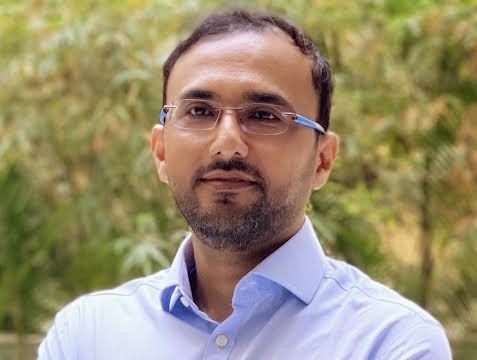One of the extraordinary attributes of Chevening fellows is the dynamic trajectory of their careers and the work they do. Their curiosity and passion compel them to expand their education, interests, and influence and pursue new opportunities and challenges. The arc of their work and interests is never static. They may start out as an engineer and years later end up running a government department, developing any number of influential organizations or services, or creating a business in blended finance.
Such is the case with Nirav Khambhati, a Chevening Rolls-Royce Science, Innovation and Policy Programme (CRISP) Fellow at Said Business School at Oxford University (2011). Thirty years ago, Nirav started out with a degree in engineering and communication. A Master of Management Studies soon followed, which led to the start of his career at Tata where, over a 20-year span, he held several positions.
During his time there, Nirav led many international projects and collaborations in the fields of telecommunications, software, and aerospace. He also branched out beyond his work and served as director on the boards of various companies within and outside India. In early 2014, he left his career in hi-tech industries to take on the mantle of turning around a fledgling and struggling edtech business of the Tata group that provided technology, financing, and capacity building to affordable private schools in India. Nirav credits this seemingly abrupt transition to the contemplation and introspection during his time at Oxford. His responsibilities were further expanded to include leading another established Tata edtech business that developed customized content for higher education institutions and corporations around the world.
Nirav’s experiences over the years and growing interests led him to become an advocate for affordable non-state education, education technology, and innovative financing mechanisms for promoting education access and quality. In 2018 he left Tata and joined Kaizenvest, an education-focused emerging markets asset management firm that oversees private equity and private debt funds in Asia and Africa. He wrote a paper on India’s edufinance success story in July 2020, which has been widely acclaimed and has become a blueprint for funding affordable education. Nirav led Kaizenvest’s work as the implementation partner of USAID’s CATALYZE edufinance programs in South Africa and Rwanda for creating microfinance facilities for affordable and high-quality early childhood development and vocational education providers.
Motivated by the success in Africa, Nirav co-founded The Blended Finance Company (TBFC) in November 2023 with a mission to allocate capital to where it’s needed most, using an approach known as blended finance. This form of finance helps the public, private, and nonprofit sectors collaborate on projects that would otherwise be very difficult to get off the ground.
Blended finance is a strategic approach to development finance designed to leverage different types of capital (public, private, philanthropic, and development finance), to mobilize resources towards creating social and environmental change, most notably towards the U.N. Sustainable Development Goals. Blended finance combines donations or grant funding with commercial finance to address market failures, mitigate risks, and unlock investment opportunities in sectors crucial for development.
TBFC plays a significant role in addressing the country’s developmental challenges while attracting private sector investment. According to Nirav, “blended finance is the key that unlocks financial resources at the scale needed to meaningfully address the world’s most pressing development challenges. Our company specializes in pioneering blended finance programs that enable investors to deploy significant capital while generating sustainable returns. At the same time, we enable donors to maximize their catalytic leverage. What sets TBFC apart are our profound sector-specific insights, expansive partner networks, unwavering focus on efficient execution, and a diverse team comprising top-tier talent across various disciplines. At TBFC, we are dedicated to reshaping the financial landscape for the betterment of society”.
The blended finance industry is fortunate to have TBFC and Nirav. In addition to everything else, Nirav is currently Chair the Board of Trustees of UK-based charity Global Schools Forum. In addition, he is a member of the International Advisory Committee of NORRAG’s IFE-2 No One Left Behind Project. Furthermore, in 2013, the British High Commission in India recognized him as a “Young India Leader”.
Nirav Khambhati was a CRISP fellow a year before I began my affiliation with the program. I don’t know for certain but I can’t imagine that 13 years ago, while he was at Oxford, that Nirav could have predicted the direction and trajectory that his work has taken him since then. I can say with a strong degree of certainty that his time in the CRISP program at Oxford played a significant role in encouraging him to be curious and creative in pursuing and broadening his interests. The program was an important step or link in the chain that has led him to the work he is doing now. His journey from engineering to creating and identifying investment opportunities in sectors crucial for India’s development — renewable energy, infrastructure, healthcare, education, agriculture, and towards projects that contribute to the U.N. Sustainable Development Goals — is an inspiration, and is at the very core of what the Chevening programs are all about.
John Hoffmire is a Research Associate at the Oxford Centre for Mutual and Co-owned Business and the Carmen Porco Chair in Sustainable Business at the Center on Business and Poverty.





